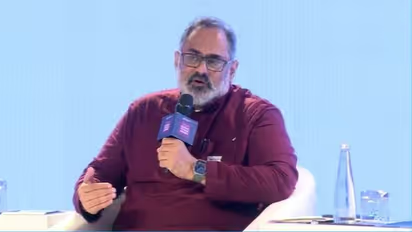India using AI in real-life use cases rather than compete with Elon Musk or Sam Altman: Rajeev Chandrasekhar

Synopsis
Union Minister of State for Electronics and Information Technology, Rajeev Chandrasekhar, emphasized the significant role of Artificial Intelligence (AI) in shaping India's future, particularly in healthcare, education, and other sectors. He clarified that the government's approach is not to demonize AI but to harness its potential for last-mile delivery.
Union Minister of State for Electronics and Information Technology Rajeev Chandrasekhar on Wednesday said that Artificial Intelligence will play a big role in how India looks at healthcare and education, among others in the next decade. Clarifying India's position on Artificial Intelligence, the Union Minister told a gathering at the Global Technology Summit 2023 that the government was not looking to overly demonise Artificial Intelligence. Instead, the intent was to harness the abilities of Artificial Intelligence for last-mile delivery.
Chandrasekhar observed, "India has been saying this since 2021. As we look at expanding innovation and the digital economy, a conversation on guardrails is equally important. Governments tend to overreact. India's position is not to overly obsess and demonise AI, and look at it only from the prism of privacy and trust. We consider AI as the biggest and most significant invention of our time. We consider it as the kinetic enabler of digital infrastructure and economy. And we believe that there is certainly a case to be made to harness the potential of AI, but at the same time come up with easily understandable and easily regulatable guardrails of safety and accountability."
India's AI strategy
Talking about the next phase of India's AI strategy, he said: "We are almost all-in into AI. We are very committed to AI. We are launching, it will be the first, India AI like we did for Semiconductors. Our focus is not to get the big bragging points or to get headlines or compete with Sam Altman or win the next Nobel Prize. We are focused on using AI in real-life use cases. Our Prime Minister is a firm believer that technology can transform the lives of people, and make governments deliver faster and better. So AI for us is going to be used to build capabilities that are aimed at real-life use cases."
"Healthcare is where we have been building deep capabilities. We believe that 1.2 billion Indians, as diverse as they are, require different kinds of healthcare and wellness responses. So AI will play a big role in how we look at healthcare, education and skilling, how we look at agriculture in the next decade, how we look at security and how we look at inclusion through language translation... so we are focused on real-life use cases that impact real people rather than, as I said, compete with Elon Musk or Sam Altman," he added.
Dealing with AI's challenges
The minister said there is a minor version of AI's challenges that the government is dealing with in terms of social media and the toxicity on the Internet. He said, "We are dealing with misinformation, deepfakes in a manner which is consistent with these guardrails. We think legal accountability for platforms that are on the Internet, is a big departure from the safe harbour concept. There cannot be a case that any platform makes, AI or non-AI, that cyberspace is a place where laws will not reach and accountability does not exist. We think that harms are committed in cyberspace by AI or any other platforms and that those who are responsible for aiding, abetting and enabling it should be accountable under law."
India's Semiconductor approach
The Union Minister said that India is today playing catch-up in the semiconductor sector, which had been neglected for over 70 years. He said, "In the last two years, we have been playing catch-up for 70 years of neglecting semiconductors; we really did not do anything about it. In the last two years, we have been doing a very rapid catch-up. So we have a very vibrant design ecosystem now that is creating IP and devices in India. We have every major semiconductor brand having R&D centres in India. We are taking steps. It is not easy to get investments in fabrication as fast, because there is competition and there is a real global shortage of talent for fabrication."
"We have moved to create a programme within our higher education system to create a talent pool of 85000 engineers. The programmes have already started to be implemented. And we hopefully will play a role as Indians in terms of the talent pool that will power the fabs and packing units. We did a smart thing by getting the industry to redesign the curriculum. And that is getting implemented; it is in the pipeline," he added.
India as Semiconductor Market
The minister highlighted that India would be a 120 billion-dollar market for semiconductors. "The electronics manufacturing industry is growing. We are a geography that is certainly not Taiwan or Korea and is not very close to a country that we all realised is not really reliable and trusted. So we have geopolitical advantages and market demand, and in areas of design, research and talent, our ambition is certainly to be out there. and competing with the best of the world," he said.
Stay updated with the Breaking News Today and Latest News from across India and around the world. Get real-time updates, in-depth analysis, and comprehensive coverage of India News, World News, Indian Defence News, Kerala News, and Karnataka News. From politics to current affairs, follow every major story as it unfolds. Get real-time updates from IMD on major cities weather forecasts, including Rain alerts, Cyclone warnings, and temperature trends. Download the Asianet News Official App from the Android Play Store and iPhone App Store for accurate and timely news updates anytime, anywhere.